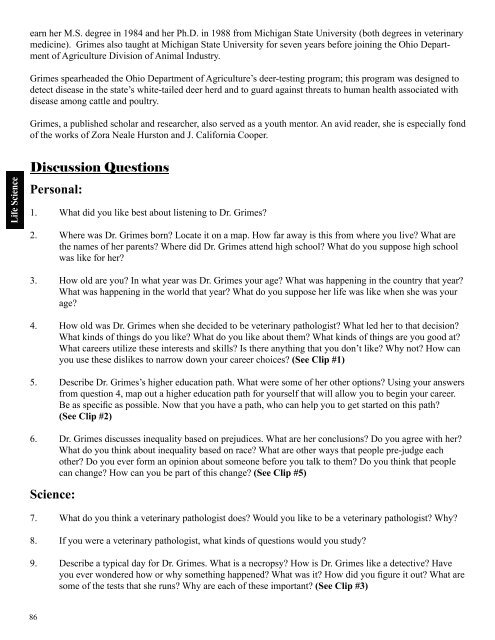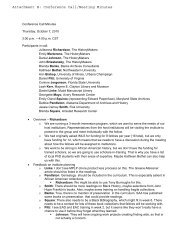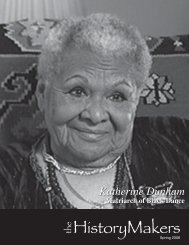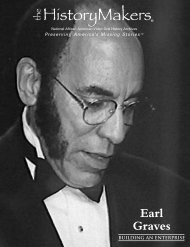ScienceMakers Toolkit Manual - The History Makers
ScienceMakers Toolkit Manual - The History Makers
ScienceMakers Toolkit Manual - The History Makers
Create successful ePaper yourself
Turn your PDF publications into a flip-book with our unique Google optimized e-Paper software.
Life Science<br />
earn her M.S. degree in 1984 and her Ph.D. in 1988 from Michigan State University (both degrees in veterinary<br />
medicine). Grimes also taught at Michigan State University for seven years before joining the Ohio Department<br />
of Agriculture Division of Animal Industry.<br />
Grimes spearheaded the Ohio Department of Agriculture’s deer-testing program; this program was designed to<br />
detect disease in the state’s white-tailed deer herd and to guard against threats to human health associated with<br />
disease among cattle and poultry.<br />
Grimes, a published scholar and researcher, also served as a youth mentor. An avid reader, she is especially fond<br />
of the works of Zora Neale Hurston and J. California Cooper.<br />
Discussion Questions<br />
Personal:<br />
1. What did you like best about listening to Dr. Grimes?<br />
2. Where was Dr. Grimes born? Locate it on a map. How far away is this from where you live? What are<br />
the names of her parents? Where did Dr. Grimes attend high school? What do you suppose high school<br />
was like for her?<br />
3. How old are you? In what year was Dr. Grimes your age? What was happening in the country that year?<br />
What was happening in the world that year? What do you suppose her life was like when she was your<br />
age?<br />
4. How old was Dr. Grimes when she decided to be veterinary pathologist? What led her to that decision?<br />
What kinds of things do you like? What do you like about them? What kinds of things are you good at?<br />
What careers utilize these interests and skills? Is there anything that you don’t like? Why not? How can<br />
you use these dislikes to narrow down your career choices? (See Clip #1)<br />
5. Describe Dr. Grimes’s higher education path. What were some of her other options? Using your answers<br />
from question 4, map out a higher education path for yourself that will allow you to begin your career.<br />
Be as specifi c as possible. Now that you have a path, who can help you to get started on this path?<br />
(See Clip #2)<br />
6. Dr. Grimes discusses inequality based on prejudices. What are her conclusions? Do you agree with her?<br />
What do you think about inequality based on race? What are other ways that people pre-judge each<br />
other? Do you ever form an opinion about someone before you talk to them? Do you think that people<br />
can change? How can you be part of this change? (See Clip #5)<br />
Science:<br />
7. What do you think a veterinary pathologist does? Would you like to be a veterinary pathologist? Why?<br />
8. If you were a veterinary pathologist, what kinds of questions would you study?<br />
9. Describe a typical day for Dr. Grimes. What is a necropsy? How is Dr. Grimes like a detective? Have<br />
you ever wondered how or why something happened? What was it? How did you fi gure it out? What are<br />
some of the tests that she runs? Why are each of these important? (See Clip #3)<br />
86










